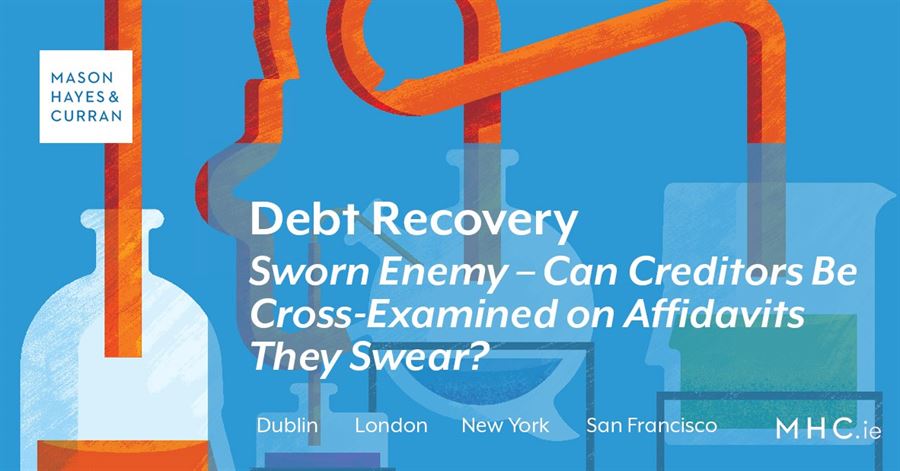
The default setting for the hearing of many contested debt recovery and security enforcement cases is by way of affidavit evidence, particularly in the High Court[1]. The creditor swears an affidavit setting out the reasons why it maintains the court should rule in its favour. Certain documents can be presented as exhibits that back up its case such as a contract. The debtor then has the chance to reply to the claims of the creditor, on affidavit.
Notice to cross-examine
However, the Court Rules go on to provide that if either side wish to cross-examine a person who has sworn an affidavit, also known as a deponent, they can serve a document called a notice to cross-examine. This document requires the party – for whom the affidavit was sworn – to produce that deponent in court. The rules go on to say that if the deponent is not so produced, then their affidavit evidence may not be relied on “unless by the special leave of the Master or the court”[2].
These rules have been frequently relied upon by debtors. In many cases, debtors have served notice to cross-examine on deponents of creditor entities to require that deponent to appear in court for the purpose of cross–examination. There may be many good reasons why a debtor will seek to do this, but in many cases it is done tactically to add delay and increase costs for the creditor.
Right to cross-examine is not absolute
There are limits on the rights of a party to a legal action to cross-examine a deponent on the contents of their affidavit. These have been explored in a number of recent judgments. The decision of Mr Justice MacGrath in The Governor and Company of the Bank of Ireland v Gerry Ward, delivered in April 2019, reiterated the following principles around cross-examination of deponents:
- The court has a discretion to order the cross-examination of a deponent on the contents of an affidavit even if a notice to cross-examine has been served in the proper form
- The court’s discretion to order that cross-examination should only be granted if the court is satisfied that there is a conflict of fact or evidence set out in the affidavits that is necessary for the court to resolve, in order to dispose of the issues
The Judge relied on previous decisions of the High Court, Supreme Court and the Court of Appeal, in reaching his decision[3]. In particular, he found that although Mr Ward was very keen to cross-examine the Bank’s deponents Mr Buckley and Ms Enright, he had not in his own affidavits contested any particular fact or piece of evidence put forward by either deponent. Accordingly, his application to cross-examine both deponents was dismissed.
Comment
If a debtor wishes to cross-examine a creditor’s deponent, they must put forward affidavit evidence which factually contradicts the deponent’s sworn evidence. In certain cases, the notice to cross-examine is used as a tactic, particularly by lay litigant debtors, to intimidate, frustrate, delay or add cost for creditors. However, High Court judges are wise to this and have shown a reluctance to permit cross-examination of deponents in the absence of conflicting facts in evidence.
Accordingly, when faced with these tactics, creditors should not be slow to highlight the absence of conflicts, where appropriate. These might include ones relating to contract execution, drawdown of funds, charging of real estate, etc.. Creditors may also seek to invoke the special leave of the court to use the evidence in their deponent’s affidavits without producing deponents for cross-examination. Requests such as these have been granted in a number of recent cases where factual conflicts were not present[4].
For more information and expert advice on successful debt recovery litigation, contact a member of our Debt Recovery team.
[1] See Order 37 and 38, Rules of the Superior Courts
[2] Order 37, rule 2 Rules of the Superior Courts
[3] See Bula v Crowley (No.4) [2003 2 I.R.430; Director of Corporate Enforcement v Seymour [2006] IEHC 369; Irish Bank Resolution Corporation Limited (in special liquidation) and ors v Sean Quinn and ors [2015] IEHC 134; Ulster Bank Ireland Limited v Michael Quinn and Bridget Quinn [2015] IEHC 376
[4] See Permanent TSB plc v Jerry Beades [2014] IEHC 81; Permanent TSB plc v Brian Donohue [2017] IEHC 143; AIB Mortgage Bank v Alan Lynskey [2017] IEHC 197; In the matter of the Bankruptcy Act 1988, as amended and in the Matter of Sean Dunne, A Bankrupt [2017] IECA 304
Share this:





